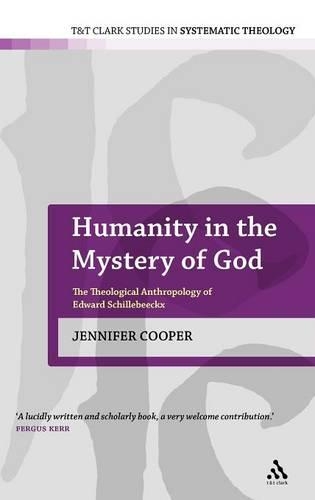
Humanity in the Mystery of God: The Theological Anthropology of Edward Schillebeeckx
(Hardback)
Available Formats
Publishing Details
Humanity in the Mystery of God: The Theological Anthropology of Edward Schillebeeckx
By (Author) Dr Jennifer Cooper
Bloomsbury Publishing PLC
T.& T.Clark Ltd
30th June 2009
United Kingdom
Classifications
Tertiary Education
Non Fiction
Theology
230.2
Physical Properties
Hardback
230
Width 156mm, Height 234mm
503g
Description
Schillebeeckx's theology is a reflection on the nature of God who is both creator and redeemer: his theology is a 'treatise' on the God who is God for humanity. This means of course that his theology is always both a reflection on the nature of God and on the meaning of humanity; and hence there is a theological anthropology at the centre of his whole theological enterprise. The 'definition' of humanity is given in the relationship between the mystery of God - the God who is both transcendent and immanent - and the mystery of humanity. For Schillebeeckx, the meaning of humanity is revealed and established in the mystery of God as a vocation to intimacy with God. This intimacy is described both as a dependence upon God and as a situated freedom, and hence the description of humanity which emerges from Schillebeeckx's treatise on God holds together humanity's metaphysical and moral significance. At the heart of this theocentric anthropology is its christological structure. Schillebeeckx develops a sacramental christology in light of his interpretation of Christ's incarnation. The relation of incarnation to the death, resurrection and glorification of Christ establishes a sacramental theological anthropology. The meaning of humanity is given in its creative, salvific, sanctifying, participative and personal relation to the God who is God both of creation and of covenant. This book develops an interpretation of Schillebeeckx's theological anthropology by analysing his theology of revelation and grace, and by examining the christological structure of his theology. This christology centres on an interpretation of the incarnation in which the fully personal nature of Christ's humanity is key. This christology establishes the sacramental nature of humanity and hence Schillebeeckx's description of the meaning of human nature is also a theological description of the meaning of human action.
Reviews
'Humanity in the Mystery of God is fascinating to read and a mine of information. It explains lucidly the influence on Schillebeeckx of his theological and philosophical masters, Marie Dominique Chenu and Dominic De Petter, and sets him in a wider historical context. Very elegantly written, its greatest strength is that it is highly original. It is the only work I know of which concentrates on the theological anthropology of Schillebeeckx in the early phases of his career. All other books devoted to his life and thought focus on his later theology. Cooper's text has the singular strength of being able to demonstrate not only a continuation between Schiillebececkx's early and late theologies, but also that it is not really possible to understand his writings of the 1980s and 90s without attending to the theological principles he first enunciated in the 1940s and 50s.' - Philip Kennedy, Mansfield College, University of Oxford, UK. -- Philip Kennedy
Stories of the part that Edward Schillebeeckx played as a backroom theologian at the Second Vatican Council, and then his equally controversial reconstruction of Christology on the basis of recent biblical studies, have overshadowed the first phase of his work, which culminated in his book 'Christ the Sacrament', now brought to light and back on to the agenda in this lucidly written and scholarly book by Dr Jennifer Cooper: a very welcome contribution.' - Fergus Kerr, School of Divinity, University of Edinburgh, UK. -- Fergus Kerr
Jennifer Cooper's book is a pleasant surprise. It provides us with the anthropology Schillebeeckx never wrote. And, perhaps more importantly, it challenges the picture, often encountered in the secondary literature, of rupture and discontinuity in Schillebeeckx' thinking before and after the Second Vatican Council. While rereading after some years Christ the Sacrament, I was struck by the deep similarity with Jesus: an experiment. Cooper's analyses of questions of method and content have confirmed my impression. Precisely this continuity may well force us to rethink the easy and lazy distinction between conservative and progressive.' - Herwi Rikhof, Faculty of Catholic Theology, Tilburg University, The Netherlands -- Herwi Rikhof
In an astute analysis of the early writings of Edward Schillebeeckx on revelation, grace, incarnation, and resurrection, Jennifer Cooper identifies an important recurring anthropological theme: at the core of the mystery of human lives and relationships is the mystery of God. This volume makes a valuable contribution not only to an understanding of Schillebeeckx's thought and to the history of theology in the twentieth century, but also to the field of theological anthropology.' - Mary Catherine Hilkert, University of Notre Dame, IN, USA -- Mary Catherine Hilkert
Author Bio
Dr Jennifer Cooper is College Lecturer in Theology, St Benet's Hall, Oxford and a member of the Faculty of Theology, Oxford. She is also a Tutor and a Lecturer in Theology at the College of the Resurrection, Mirfield. Jennifer Cooper took a doctorate in theology at the University of Oxford where she held a Research Fellowship at Keble College.
